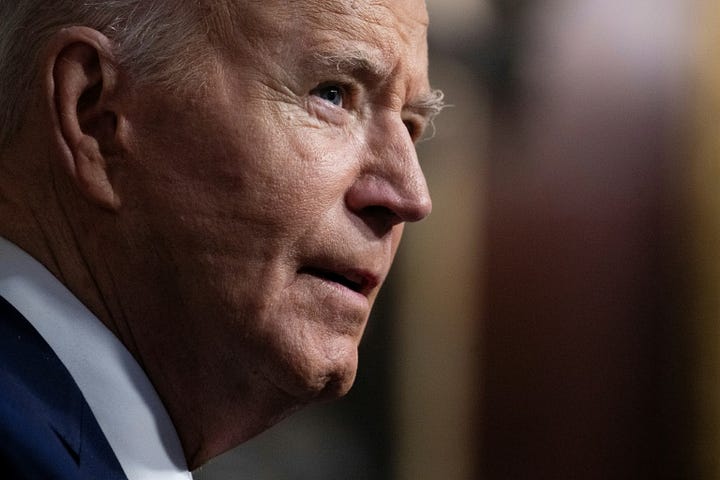The Cosmopolitics Edit
Biden moves beyond "private outrage" on Gaza, the far-right is seizing the EU and how can the US learn from Taiwan's earthquake?
hi all: Welcome to my new weekly roundup, including my take on the week’s top foreign policy news, some below the fold stories that resonated with me and a few things I’m watching for the week ahead. I’ll also offer some lighter content to enjoy over the weekend. Let me know what you think in the comments below .


About 200 humanitarian aid workers, mostly Palestinians, have been killed during the war. It took the shocking death of 7 World Central Kitchen workers for President Biden's facade of private “outrage" about Israel’s actions in Gaza to crumble. In a notably tense call with Israeli Prime Minister Benjamin Netanyahu, his ultimatum was clear: protect aid workers, open additional crossings into Gaza, move toward a ceasefire, and improve the humanitarian situation—or face a shift in U.S. policy. He also pressured Netanyahu to reach a hostage deal with Hamas. It all suggests a potential end to the blank-check support of Israel and possibly a newfound willingness to leverage U.S. aid and military support to ensure compliance with humanitarian norms, although no White House official has said that explicitly. The ball is in Netanyahu's court, but equally, the spotlight is on Biden.
What Israel is saying: The IDF fired two officers for having misidentified the WCK convoy and formally reprimanded two others for their role in the deadly attack. In a statement issued Friday, the IDF released the preliminary findings of its investigation into the killings, in which successive airstrikes were used to target three vehicles carrying the WCK staffers in Gaza.
“Following a misidentification by the forces, the forces targeted the three WCK vehicles based on the misclassification of the event and misidentification of the vehicles as having Hamas operatives inside them, with the resulting strike leading to the deaths of seven innocent humanitarian aid workers. The strikes on the three vehicles were carried out in serious violation of the commands and IDF Standard Operating Procedures,” the IDF admitted.
Netanyahu did not publicly outline the details of his call with Biden, but hours later initiated several actions to address Biden's concerns, These included agreeing to use Ashdod port for directing aid into Gaza, opening the Erez crossing for the first time since Oct. 7 and increasing aid deliveries from Jordan. He also committed to more measures aimed at minimizing civilian casualties and furthering efforts towards a temporary ceasefire to facilitate a hostage release.
In a meeting Thursday in Jerusalem with visiting Republican lawmakers, the prime minister pushed back strongly against Biden’s insistence on discussing a two-state solution to the Israeli-Palestinian conflict in the wake of October 7.
“There is a contrary move, an attempt to force, ram down our throats a Palestinian state, which will be another terror haven, another launching ground for an attempt, as was the Hamas state in Gaza,” Netanyahu said. “That is opposed by Israelis, overwhelmingly.”
➤ What World Central Kitchen is saying:
WCK founder Jose Andres was emotional as he spoke of the death of his colleagues. He accused Israel of a “direct attack” on the aid workers' convoy, stating he believed the Israeli military deliberately targeted them "systematically, car by car." In an interview with Reuters, he recounted how the group coordinated its movements with the IDF and attempted to communicate during the attack. After the IDF struck the first armored car, the team managed to escape to a second car, which was then also attacked, forcing them to move to a third. The aid workers tried to make clear who they were, he explained, emphasizing that the IDF was aware of their location.
WCK has called the disciplinary actions against IDF soldiers “cold comfort” and is calling for an independent third-party inquiry to examine the incident. Now, Andres is using his profile to speak out on what he called a “war against humanity itself," implying a harsh reality where starvation is weaponized and the conflicting U.S role of providing humanitarian aid while simultaneously arming Israel.
➤ What Democrats are saying: With public opposition to the war in Gaza growing, especially in swing states, some of Biden’s closest Democratic allies are urging him to exercise control over military aid to Israel. Senator Chris Coons (D-DE), a staunch supporter of Israel, said for the first time that he would support placing restrictions on future aid if Israel won’t take steps to reduce civilian casualties and distribute aid.
“I think we’re at that point,” Mr. Coons said on CNN on Thursday, adding if Netanyahu were to order the Israeli military into Rafah and “drop thousand- pound bombs and send in a battalion to go after Hamas and make no provision for civilians or for humanitarian aid, that I would vote to condition aid to Israel.”
His comments reflect the deepening rift between Senate Democrats and Netanyahu over the war in Gaza. Last month Senate Majority Leader Chuck Schumer called for early elections in Israel.
➤ Lavender, the AI machine directing Israel’s bombing spree in Gaza: a bombshell report, denied by Israel, details ‘Lavender,’ an Israeli artificial intelligence program generating targets for assassination and playing a “central role” in bombing Palestinians in the Gaza war, influencing military operations “as if it were a human decision.”
➤ There are still 140 hostages being held by Hamas. CIA director William Burns will travel to Cairo this weekend for talks with the head of Israel’s Mossad and top Qatari and Egyptian officials to secure a deal for the release of 40 hostages (women, including female soldiers and elderly, sick men) in exchange for a six-week pause in fighting and about 700 Palestinian prisoners, including some serving life sentences for killing Israelis.
➤In the region: Iran vowed to retaliate against Israel and the U.S. for an airstrike that targeted its embassy complex in Damascus, Syria. The attack killed at least seven Iranian officials, including Mohammed Reza Zahedi, a top commander of Iran’s Revolutionary Guards Corps and most significant Iranian casualty since the U.S. assassinated IRGC General Qassem Soleimani in 2020. The IDF hasn’t officially commented, but suggested the targeted site was a military building of the Quds Forces. In an unusual move, the US directed questions about the attack to the Israelis.
Mass casualties in Taiwan’s largest earthquake in 25 years Search and rescue efforts continue after a 7.4 magnitude earthquake rocked Taiwan on Wednesday, resulting in at least nine fatalities and injuring over a thousand people. More than 140 people are still missing, including around 70 workers at two rock quarries. The United States Geological Survey (USGS) reported 29 significant aftershocks, with tremors felt across the island, including Taipei. Additional tremors, possibly up to magnitude 7, are anticipated in the coming days. The epicenter was in Hualien County, a region home to about 300,000 people, where many reside in hard-to-access coastal or mountainous areas, complicating rescue efforts.
➤ Lessons learned for the U.S: Following a devastating earthquake in 1999, Taiwan upgraded its seismic infrastructure and was well-prepared for this week’s quake – experts say more so than parts of United States.
➤ Fact check: Old photo of tilting quake-hit building falsely linked to 2024 (AFP)
NATO turns 75. As NATO celebrated its 75th anniversary, the alliance faces the monumental task of adapting to the complexities of modern security threats, underscored by Russia's aggression in Ukraine. The alliance, now comprising 32 nations, has deterred state aggression for decades, from the Cold War era's Soviet threats to the solidarity shown after the 9/11 attacks. Member states are contemplating providing long-term military support to Ukraine amidst Kyiv’s intensified appeal for more arms and air defenses.
NATO has evolved from solely a European security framework to addressing challenges in Afghanistan, Libya, and now is refocusing on collective European defense as a bulwark against Russia. The support of Ukraine and the fast-track accession of Finland and Sweden reflect the threats confronting NATO today, though the alliance does face internal divisions on arming Ukraine.
Concerns over former Donald Trump's potential return to office loomed over the celebrations. With Trump hinting at conditional defense based on allies' spending, the alliance is discussing how ro "Trump-proof" NATO to safeguard its commitments irrespective of U.S. political shifts.
As NATO navigates this uncertainty, the central question remains how it will evolve to meet the complex security demands of the 21st century while maintaining the solidarity that has been its cornerstone for the past 75 years. In an op-ed in Foreign Policy, British and Swedish foreign ministers write to ensure NATO can respond to the new realities of global security, it must enhance its investments in modern warfare technologies like cyber and artificial intelligence, adapt to the changing nature of conflict as seen in Ukraine and expand beyond its geographical boundaries to address global threats, involving strategic partnerships in vulnerable regions and the Indo-Pacific.
Opposition deliver’s major blow to Ergodan. Turkish President Recep Tayyip Erdogan's AK Party suffered significant losses in last weekend’s local elections, marking a shift in the nation's political landscape. The opposition claimed victory in major cities including Istanbul and Ankara, with Istanbul's incumbent mayor, Ekrem Imamoglu, securing over 50% of the vote, defeating the AK Party candidate by a large margin. This election marks the first countrywide defeat for Erdogan's party in 21 years. Opposition victories in these cities underscore a growing resistance to Erdogan's rule, highlighting economic dissatisfaction among voters. Erdogan told his supporters he views the election setbacks as a turning point rather than an end, committing to address the party's shortcomings. The election results strengthen the opposition, positioning Imamoglu as potential presidential candidate for 2028.
Ugandan court upholds sweeping anti-gay law citing Dobbs. Uganda's Constitutional Court, the country’s second-highest judicial body, declined to nullify the Anti-Homosexuality Act 2023, which includes the death penalty for certain same-sex acts but struck down some sections violating fundamental human rights, like the right to health, privacy, and freedom of religion. In its ruling, the court cited the US Supreme Court decision overturning Roe v. Wade to uphold the harsh law, which has been criticized globally and led to sanctions from Western nations and a pause in lending by the World Bank. The court's decision keeps most of the law's provisions, including life imprisonment for consensual same-sex relations and the death penalty for "aggravated homosexuality." The UN called for a complete repeal and the U.S. said it will maintain human rights, emphasizing the law's threat to human rights and Uganda's global standing.
The European Union’s lurch to the right. The upcoming European Union elections in June are setting the stage for a significant shift to the far-right in the EU parliament. Populists are anticipated to lead in nine countries, including France and Italy, and be strong contenders in several others.
Polls predict big gains for right-wing parties with Eurosceptic and anti-immigration stances, including the Identity and Democracy (ID) and the European Conservatives and Reformists (ECR), led by Italian Prime Minister Georgia Meloni.
The swing to the right is a potential watershed moment in European politics with far-reaching implications for EU Parliament, historically dominated by more centrist forces since 1979. The election could test European unity on democratic governance, defense, and migration, with far-right parties advocating for stricter immigration controls. An emboldened far right might also undermine the EU's climate goals, pushing for a rollback on climate commitments.
The rise of the far right in the EU Parliament reflects broader trends of political polarization and the increasing appeal of nationalist and populist platforms across Europe. Mainstream parties are considering alliances with far-right groups, indicating a potential embrace of their policies to maintain power.
The prominence of these parties on TikTok underscores a strategic pivot in far-right campaigning, reaching a younger demographic with a mix of populist rhetoric and viral content that often blurs the lines between political discourse and entertainment. Jordan Bardella, the 28-year-old candidate in June protégé of France’s far-right Marine Le Pen, boasts over 1 million TikTok followers. TikTok has limited the influence of German far-right politician Maximilian Krah, a member of the EU Parliament over the spread of conspiracy theories, such as the Great Replacement theory that suggests white populations are set to be replaced by non-white people.
Forbes list of world’s wealthiest billionaires: more than ever — and they're wealthier. Forbes' latest list of the world's billionaires for 2024 reveals a record number of billionaires, totaling 2,781, surpassing last year's count by 141. Their collective wealth has also reached a new high of $14.2 trillion, indicating a $2 trillion increase from 2023. The United States leads with a record 813 billionaires, the highest number globally, followed by China with 473 and India with 200, marking a milestone for India.
World’s oldest man, dies 114 — secret to longevity: a daily shot of booze The world's oldest man died in Venezuela weeks shy of his 115th birthday. Juan Vicente Pérez Mora, one of the last living men born before 1911, attributed his long life to hard work, rest, daily prayers, and a glass of aguardiente. Venezuelan President Nicolás Maduro and others paid tribute to his legacy, The Guinness World Records revealed that John Tinniswood, aged 111 years and 222 days old, from Southport, Merseyside, UK is now he world's oldest man.
Everyone loves a panda - but not like South Koreans More than 6,000 emotional South Koreans lined the streets of Yogin, wiping their tears as they said say goodbye to Fu Bao, the first giant panda born in South Korea who left for China to join a breeding program. Her parents were sent to South Korea as part of China’s "panda diplomacy" program and after Fu Bao was born, she doubled the number of visitors at the park. You have to see it.
Lighter Weekend Fare
📺 Watch After the long success of Patti’s Mexican Table which features authentic dishes from Mexico’s various regions, best-selling author and Pati Jinich has introduced La Frontera, which explores communities along the Borderlands and the cuisine that blossoms at the intersection of US and Mexican cultures. I share a mutual friend with Patti and have been lucky to dine at her home a few times. She is fantastic chef and a warm, gracious host – all of which shines through in this terrific PBS series. You can find both shows and amazing recipes on Pati’s Website
🎙️Listen I love the Freakanomics podcasts and Stephen Dubner recently did an excellent three-part series on immigration. You may joke about moving there after the 22024 election, but the episode“Why Is Everyone Moving to Canada?” explores why Canada is such an attractive place for immigrants.
📚Read: Paper Soldiers: How the Weaponization of the Dollar Changed the World Order Bloomberg’s economics correspondent Seleha Moshsin explores how America's control over the dollar, as the world's reserve currency, has bolstered its power to impose economic sanctions, especially against Iran and, more recently, Russia. The global reliance on the dollar for commerce has made U.S. sanctions profoundly impactful, but Moshin questions their potential fragility if America's economic dominance falters due to political instability and fiscal challenges.
Got suggestions for lighter weekend fare? Leave a comment below or DM me!







70 innocent civilians in exchange for 700 Palestinians including those accused of murder. How can anyone agree to that? And 6 weeks of fighting pause so Hamas can re-group. Sorry but there has to be another way.
Again I learn things I didn’t pick up on this week. I appreciate you filling me in. I suppose I’ll be hearing more about Lavender from here on. Makes sense that AI may be behind the WCK killings.
I’ll check out Freakanomics but not too much into podcasts. Maybe this sways me.
I’m looking for my next book. I’m nonfiction, current affairs reader. Suggestions? I am open to anything … but cookbooks 😉